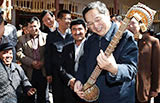Full Text: Historical Witness to Ethnic Equality, Unity and Development in Xinjiang
(Xinhua) Updated: 2015-09-24 13:13Since its establishment in 1955, the Xinjiang Uygur Autonomous Region has remained committed to supporting and improving the system of ethnic regional autonomy. It has implemented China's ethnic policies, endeavored to promote the unity and common prosperity of various ethnic groups, and developed and consolidated the new type of socialist ethnic relations of equality, unity, mutual assistance and harmony.
The principle of equality among all ethnic groups has been upheld. All ethnic groups in China, regardless of the sizes of their population and levels of development, are equal. They enjoy equal rights and are required to fulfill the same obligations in accordance with the law. The establishment of the system of ethnic regional autonomy served to protect the legitimate rights and interests of ethnic minorities and safeguard the equal rights and interests of individual citizens. People of all ethnic origins in Xinjiang are ensured an equal legal status. They enjoy the rights to vote and stand for election as prescribed by the Constitution and the law, the right of equal participation in the administration of state affairs, the right of religious belief, the right to receive education, the right to use their own spoken and written languages, the right to inherit and carry on the traditional culture of their own ethnic groups, etc.
The region has focused on eliminating ethnic misunderstandings carried over from the past; it has firmly opposed any form of ethnic oppression or discrimination, and outlawed any action that might sabotage ethnic unity or incite ethnic separatism. In addition to respecting and protecting the rights and interests of all ethnic peoples within their jurisdiction, governments of ethnic autonomous areas at various levels shoulder at the same time the responsibility of safeguarding national unification, ethnic unity and social stability.
Internal affairs of the ethnic autonomous areas are administered independently. Home to more than a dozen major ethnic groups, the Xinjiang Uygur Autonomous Region is the only autonomous region in China with three levels of autonomous administrative divisions (region, prefecture and county). It boasts five autonomous prefectures, six autonomous counties and 42 ethnic townships. The people of each ethnic autonomous area elect their own deputies to the people's congress and form the self-government organs of power to exercise the right to manage their own internal affairs. In the composition of deputies to the people's congresses and the appointment of officials, the region's self-government organs at each level have always adhered to the principles of equal participation and common management. In 2014, the 550 deputies to the 12th People's Congress of the Xinjiang Uygur Autonomous Region came from 14 ethnic groups, with 66 percent being ethnic minorities themselves, three percentage points higher than the proportion of the total population of all ethnic groups in Xinjiang. Of nine chairperson and vice chairpersons of the Standing Committee of the current regional people's congress, six are citizens of ethnic minority origins. In Xinjiang now, the heads of the autonomous region, all the autonomous prefectures and all autonomous counties are citizens from the ethnic group(s) exercising regional autonomy in the areas concerned. Moreover, an overwhelming number of the heads of other prefectures, cities and counties are citizens of ethnic minority origins. Ethnic groups in Xinjiang also enjoy the right of equal participation in the administration of state affairs. Of 60 deputies from Xinjiang who attended the 12th National People's Congress in 2014, 38, or over 63 percent, were ethnic minorities. There are many people of ethnic minority origins from Xinjiang holding leading posts in central and state organs.
According to the Constitution of the People's Republic of China and the Law of the People's Republic of China on Ethnic Regional Autonomy, ethnic autonomous areas have the right to enact autonomous and separate regulations to adapt the provisions of the state law, administrative regulations and local regulations in accordance with their local conditions. These stipulations have played an important role in safeguarding the legitimate rights and interests of the ethnic minorities and promoting economic and social development in ethnic autonomous areas.
All ethnic groups are guaranteed the right to use and develop their own spoken and written languages. Xinjiang is a region of multiple spoken and written languages, of which there are ten principal ones. The region has enacted the Regulations for Work Concerning Spoken and Written Languages in the Xinjiang Uygur Autonomous Region, which provides a legal basis for the extensive use of the spoken and written languages of ethnic minorities in such fields as justice, administration, education, news media, publishing, radio, movies, television programs, the Internet and daily life. Government organs in handling public affairs and various other organizations in recruitment and promotion tests all use the language(s) of the ethnic groups exercising autonomy in a given area. Seven languages are used as teaching languages in primary and secondary schools in the region, five languages are used in broadcasting and television programs, and six languages are used in publishing books, audio-visual products and electronic publications.
The Law of the People's Republic of China on the Standard Spoken and Written Chinese Language rules that the standard spoken and written Chinese language is Putonghua (a common speech with pronunciation based on the Beijing dialect) and the standardized Chinese characters. The autonomous region encourages ethnic minorities to study the standard spoken and written Chinese and offers appropriate courses in primary and secondary schools, and it also encourages ethnic minority peoples to study one another's languages so as to enhance mutual understanding and communication. Since 2010, the autonomous region has required that newly recruited civil servants must acquire basic skills in both the standard and ethnic languages before they enter the service, and that they must be provided with opportunities of and conditions for bilingual training.
The customs of ethnic minorities are respected and the freedom of each ethnic group to maintain or reform its own customs is protected. In 2004, the region formulated the Halal Food Regulations of the Xinjiang Uygur Autonomous Region to protect the halal dietary customs of the relevant ethnic groups, which stipulated that departments in charge of ethnic affairs of the people's governments at/above the county level are vested with the responsibility of supervising and exercising control over the production and supply of halal food within areas under their jurisdiction. The region also renders support to and guarantees the production and supply of special supplies to ethnic minorities. Ethnic minorities which have the tradition of inhumation (ground burial) are exempt from the government requirement for cremation, and are allotted special plots for cemeteries. Major festivals of the ethnic minorities are also made official public holidays in Xinjiang. The region encourages all ethnic groups to respect one another's customs while encourages following more scientific, civilized and healthy customs in relation to food, clothing, shelter, transportation, weddings, funerals and etiquettes.
Candidates of ethnic minority origins are selected and cultivated as officials and professionals. A large number of administrative officials and technical professionals from ethnic minority groups have been fostered through training courses and working at the grassroots level, or through work exchanges or job rotation. In 1955, the number of ethnic minority officials in Xinjiang was 46,000, which increased to 417,000 in 2014, accounting for 51.4 percent of the total officials in the region. When selecting leading officials and recruiting civil servants, the autonomous region implements more flexible policies such as setting a recruitment ratio and offering directional recruitment and bonus points in favor of ethnic minorities, so as to make sure that a certain number of ethnic minorities join the civil service. The proportion of ethnic minority civil servants in the total recruitment increased from 29.9 percent in 2009 to 48.3 percent in 2014.
Special support has been given to professional personnel of ethnic minority origins. Since 1992, the state has put in place a special program to train professionals of ethnic minority origins in key areas of science and technology by way of holding training courses, advanced studies, exchanges and being placed on more challenging posts, etc. and by the end of 2014 the region had trained in total 3,917 middle- and high-caliber professionals of ethnic minority origins badly needed in Xinjiang.
In key areas of science and technology, Xinjiang has established and implemented a fund for special training of science and technology talents of ethnic minority origins since 2000. The number of ethnic minority technical professionals in Xinjiang increased from 124,300 in 1985 to 294,400 in 2014, and the proportion rose from 34.43 percent to 58.37 percent of the total number of such people in the region. The number of ethnic minority professionals with academic titles equivalent to professor and associate professor reached 21,100 in 2014.
The ethnic regional autonomy provides an institutional guarantee to ethnic unity. The region's population totaled 5.1 million in 1955 while by 2014 it had increased to over 23.2 million, of which 14.6 million were ethnic minorities, making up 63 percent of the total. The region has carried out all kinds of educational programs advocating ethnic unity, paying particular attention to education of the youth, as evidenced by courses on ethnic unity and knowledge about the various ethnic groups offered in various institutions of learning - from primary schools to universities. In Xinjiang, unremitting efforts have also been made in holding activities promoting ethnic unity and progress. To advocate ethnic unity and counter acts undermining it, the autonomous region has since 1983 held seven meetings awarding those making outstanding contribution to ethnic unity and progress, and commending units and individuals who have excelled in this regard. To date, the State Council, the State Ethnic Affairs Commission and the Xinjiang Uygur Autonomous Region have commended 1,304 model units and 2,272 exemplary individuals. Since 1983, the region has held an "educational month of ethnic unity" each May, carrying out intensive and extensive public publicity on ethnic unity. In 2009, the region promulgated the Regulations of the Xinjiang Uygur Autonomous Region on Ethnic Unity Education, further regulating ethnic unity education activities in order to call people of all ethnic groups to safeguard ethnic unity. By the end of 2010, the region had enacted the Measures for the Administration of Commendation of Role Models Contributing to Ethnic Unity Activities (Trial). The region encourages all members of ethnic groups to strengthen contact, exchange, integration and mutual support mechanisms, and advocates that primary or secondary school students of all ethnic groups study in the same classes and schools. It has become an important ideological guarantee for ethnic unity that "the Han Chinese cannot live without the ethnic minorities, the ethnic minorities cannot do without the Han Chinese, and no any one minority group can live without the other minority groups."
Along with the region's economic and social development in recent years, increasing mobility has been witnessed in the population of different ethnic groups in Xinjiang. There has been a rising trend in the urbanization and scattered living of ethnic minorities (who used to live in remote rural areas in concentrated communities - ed.), and as such the contact and exchange among them have grown ever closer. In work, study and entertainment as well as shared community life, people of different ethnic origins have enhanced their friendship and mutual understanding.
- China respects religious freedom, but fights extremism: white paper
- Shanghai slaps three-year ban on entertainers caught doing drugs
- China issues white paper on Xinjiang ethnic equality, unity
- Another corruption suspect repatriated from US to China
- Cross-border triad operation snares 19,000 crime suspects
- Leaders target ongoing bureaucratic inaction
- Beijing to add bicycles, crack down on illegal parking
- Wastewater cleaning finished at Tianjin blast site
- 877 investigated for corruption in financial sector
- Xinjiang gets a helping hand to improve locals' livelihoods







